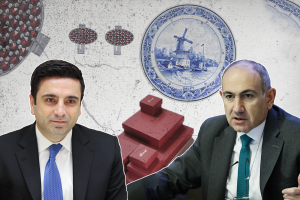According to Article 29 of the RA Law on Public Service, “Public servants and persons holding public positions must not accept, or agree to accept in the future, any gift”.
Ms Elina Geghamyan, Adviser to the Minister of Justice of the Republic of Armenia, notes that this ban applies to all public office holders and public servants in the RA, i.e. the entire system of civil service, the system of administrative, discretionary, and political positions. “It generally includes the entire state and community service. In the RA Law on Public Service, we currently have two concepts: public servants and person holding a public position. Persons holding public positions include both political, discretionary, and administrative positions, as well as autonomous positions, including judges, investigators, prosecutors, that is, the entire state system with its three branches of power: legislative, executive, and judicial.
The concept of gift was also defined.
-It includes any advantage related to property interests that would not reasonably be granted to a person not holding the position. It shall also include ceded claims, surrender of claims without compensation or at an apparently disproportionately low price, property transferred without compensation or property sold at an apparently disproportionately low price, services rendered or work carried out without compensation or at an apparently disproportionately low price, as well as preferential loans, gratuitous use of another’s property, and other actions, as a result of which a person derives benefit or advantage.
There are 4 groups of gifts that public officials and civil servants can receive.
– The first are the gifts given or hospitality organized during state or official visits or events, as well as work visits.
The second: scholarships, grants or benefits awarded in a public competition on the same conditions and criteria as those which apply to the other applicants, or as a result of another transparent process.
The third: materials provided free of charge for official use.
The fourth: ceremonial gifts given by foreign states and international organizations.
There are cases when a gift received by a public servant becomes the property of the state.
– Ceremonial gifts where the value of a gift accepted exceeds AMD 60 000, and those gifts that are not permissible to receive are related to official duties, according to the advisory opinion they are inadmissible, but it is not possible to pay adequate compensation..
What to expect if a public servant has received an impermissible gift in connection with official duties?
– In case if the public servant received an impermissible gift related to his/her official duties, an administrative responsibility is defined for that act, and also, if it is a gift subject to registration and the official does not record it in the gift register, a administrative responsibility is provided by the Code on Administrative Offenses as well. In some cases, criminal liability may arise if the impermissible gift is a bribe.
Regulations are also planned regarding the deposing of gifts that become the property of the state and other issues.
-In 2023, the Ministry of Justice has developed another new legislative package in connection with the institute of gifts, with which we plan to make changes in the “Law on State Property Management”, the “Law about the State Protocol” and the Law on Public Service. The National Assembly has already accepted the draft by in the first reading. The purpose of the draft is to regulate the relationship between the management of gifts that become the property of the state, because according to the current legislation, we have two cases when the gift received by a public servant, a person holding a public position, becomes the property of the state, but the law does not regulate what the state will do with the gifts that become the property of the state, how it will be managed, which is problematic both for the giver of the gift, for the public servant and for the public in general, because the fate of that gift should be predictable and clear. With this draft, we propose to clearly define the ways of managing the gifts, the bodies managing the gifts, and to clearly separate their powers.
Some changes are also planned in the “Law on Public Service”. Currently, one of the 4 groups of gifts allowed is the property provided for official purposes, but there we have a certain internal contradiction, because the gift can only be considered the property that is transferred to the public servant by the right of ownership, and the property given for official purposes is given only for temporary use and therefore it cannot be considered as a gift. Thus, this amendment will be made and property provided for service purposes will be removed from the scope of permissible gifts, stressing that such property is not considered a gift.
Elina Geghamyan states that it is important to point out that the goal of this institute is to form awareness both among officials and citizens that an official should not receive gifts related to the performance of his duties.
Details in the video
This publication was prepared within the framework of the “Multi-Faceted OGP Action: Open Justice & Anti-Corruption Commitments on E-Courts & Gift Registry” project implemented by the “Armenian Lawyers’ Association” (ALA) NGO with the support of the Open Government Partnership (OGP), funded by the European Union (EU) within the framework of the “EU for Integrity Programme for the Eastern Partnership” Action.
This publication expresses the position of the author, the ALA, which does not necessarily coincide with the position of the OGP and the EU.

















